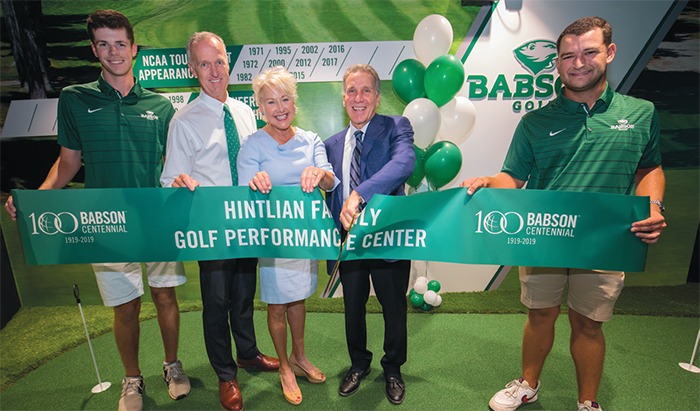
Photo: Dan Vaillancourt
The Hintlian Family Golf Performance Center opened in September as part of the Babson Recreation and Athletics Complex facility enhancements project. The center features a Foresight golf simulator that tracks data while players are on a virtual course or on the range. A putting and chipping area allows golf team members to work on their short game year-round.
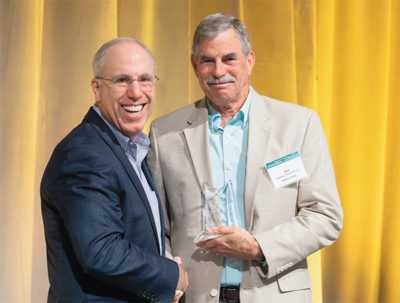
Photo: Justin Knight
Babson President Stephen Spinelli Jr. MBA ’92, PhD honored Jon Anderson ’75, P’04 ’08 ’13 ’13 (right), head men’s soccer coach and senior associate athletics director, with the Joseph R. Weintraub Alumni Award for Distinguished Faculty/Administrator Service. “I am deeply humbled by this award and grateful for those involved in nominating me,” said Anderson, who received the honor during the leadership awards brunch at Back to Babson.
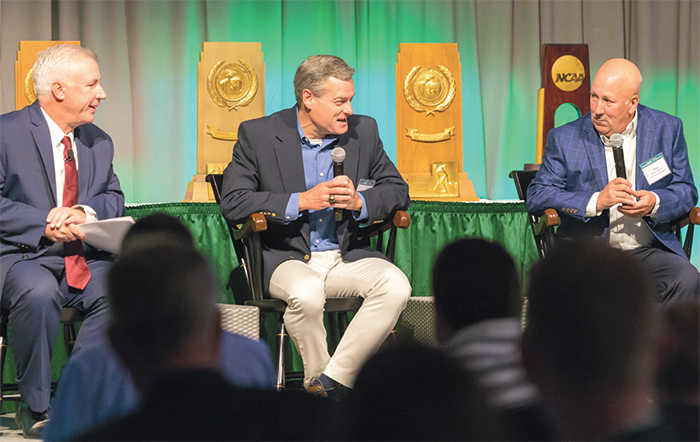
Photo: Jon Endow
The athletics department honored its five national championship squads as the first teams inducted into the Babson Athletics Hall of Fame. The historic celebration during Back to Babson brought together the 1975, 1979, and 1980 men’s soccer teams, the 1984 men’s ice hockey squad, and the 2017 men’s basketball team as part of the 17th induction class. The five squads joined 71 individuals who have been inducted since the Hall of Fame’s inception in 1991. Pictured left to right, are Dan Roche P’20, and hockey alumni Ed Gavin ’84 and Paul Donato ’84.
]]>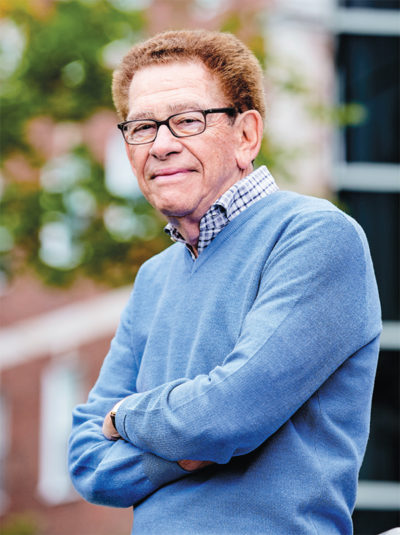
Senior Lecturer Ed Marram
Photo: Michael Quiet
Ed Marram isn’t just interested in helping students become successful entrepreneurs. He wants them to make a difference in the world.
After a successful scientific career that led him to found and grow his own business, Marram, a senior lecturer in entrepreneurship, made time to study under Professors Neal Churchill and Bill Bygrave at Babson until he felt ready to teach. He has been a faculty member in the Entrepreneurial program for more than 30 years, starting as an adjunct lecturer, then joining the full-time faculty after he sold his business in 2005.
Marram teaches Managing Growing Businesses, a graduate-level course designed to provide insight into the challenges and opportunities of growing an entrepreneurial company, and a number of executive education courses. He has taught students from all around the world, both at Babson and in their home countries. Some of those relationships have become long-term commitments. For example, Ulster University in Northern Ireland, started coming to Babson about 12 years ago to learn about entrepreneurship. Last year, Ulster awarded Marram with an honorary doctorate.
“I’m surprised by how much knowledge and interest my students have,” Marram says. “All of them want to be entrepreneurs—and all want to know how to better run a business.” But his students’ focus isn’t just on the bottom line, he notes. Many are creating socially responsible businesses. “It’s not just about making money,” he says. “It’s about doing good for people and the environment.”
For example, one of Marram’s students provides microloans to poor women in Mexico. “A small loan doesn’t change their socioeconomic status, but it does make a huge difference in their individual lives,” Marram says.
Marram brings a wealth of entrepreneurial knowledge to Babson. He owned Geo-Centers Inc., a high-technology, professional services firm, for more than 35 years, growing the business to a staff of 1,400 people and $200 million in revenue. The firm was recognized twice by Inc. magazine as one of the fastest-growing, privately held companies in the United States. That background, he notes, brings “broad, real-life experience—and real-life problems—to the classroom.”
Beyond his work at Babson, Marram has served on the boards of several privately held companies and at institutions of higher education. He is a member of the National Association of Corporate Directors, and he previously served on the Health and Educational Financial Authority of Massachusetts.
Marram speaks with pride about the learning experience at Babson. “The unique thing about (the College) is that it has practitioners like me teaching entrepreneurship,” he says. “What better enrichment can you have than people who have actually experienced and survived the issues companies face?” – Amy Davis
]]>At Attitudes Dance and Fitness in Billerica, Massachusetts, Associate Professor of Entrepreneurship Brad George, who is the co-owner and chief financial officer, considers himself “a behind-the-scenes jack of all trades.” While co-owner and artistic director Dawn George oversees ballet, jazz, contemporary dance, hip hop, and tap classes for children along with dance and fitness classes for adults, Professor George handles business and marketing strategy along with accounting responsibilities. By bringing his experiences back to the classroom, he hopes to impart knowledge about all aspects of owning a business.
“Students think about the big, glamorous businesses; most startups are not big or glamorous,” Brad George says. “Even with a relatively small business, you deal with a lot of the same issues, things you don’t necessarily read about.” For example, he says the pressure of finding new space after their building was sold almost led the Georges to close their business.
In owning the dance studio, Brad and Dawn George have put their business first and have dealt with making sacrifices, which is a key lesson he has conveyed to his students.
“Most businesses require you to put most of your time and money and everything else into them,” Brad George says. “You don’t want to get in there and realize: ‘This is not at all what I thought it was going to be.’”
He also asks his students to determine what they hope to get out of their ventures. For Brad and Dawn George, their focus is on serving the community. “We have a very different set of goals for our business than other people might,” Brad George says. “I’m a big believer that entrepreneurship isn’t about making the most money; it’s about having a life you want to live.”
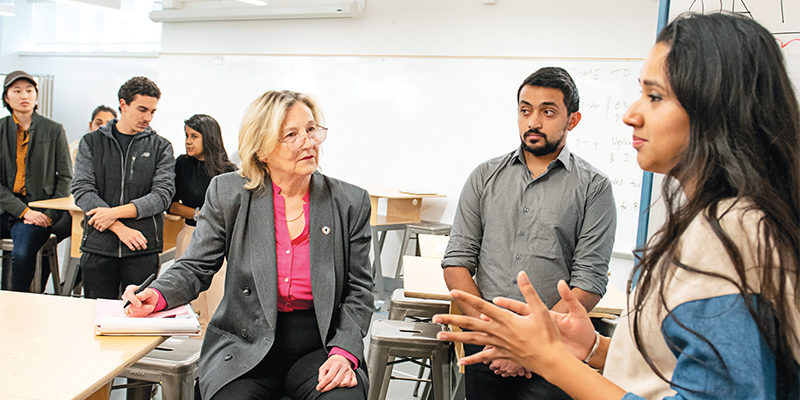
Senior Lecturer Caroline Daniels teaching in the Design Zone at Babson College.
Photo: Webb Chappell
Lessons from Overcoming Challenges
For more than 20 years, entrepreneurship senior lecturer Caroline Daniels managed Daniels Island Properties in Nantucket, a company that built and purchased properties on the island and rented them out to vacationers during the summer months.
On most summer days, Daniels would be in constant contact with architects, building contractors, and real estate professionals responsible for marketing her properties. At the end of each summer, Daniels would close up shop for the winter.
“In any business, you run experiments,” says Daniels, who also has started other ventures, most notably in strategy consulting. “You have to find a really good niche to operate in, and you need to have great customer supplier and other stakeholder relationships.”
When she returned to Babson each fall, Daniels would share stories of how she overcame adversity in her business. Her most frequent tale, she says, involved an early morning delivery of incorrect parts for a home soon to be constructed. She has told her students how she solved the problem by involving everyone as a team to find a solution.
The experience of overcoming a challenge can serve as an inspiration and a how-to for students, Daniels says. “The joy for me in combining both practical, entrepreneurial experience and academic teaching is that I get to share everything I’ve learned with students and give them a pathway. I feel that reduces the risk for them.”
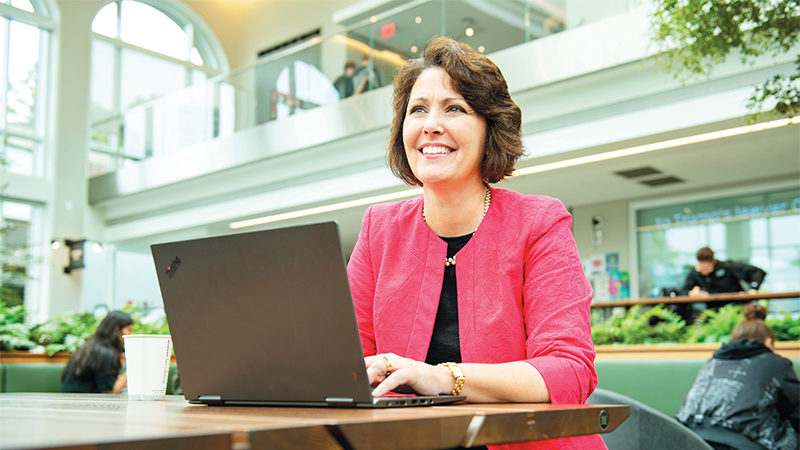
Sandra Bravo MBA’87 working on her consulting business, Bravo Communications.
Photo: Webb Chappell
Getting the Students Involved
For the past 25 years, marketing lecturer Sandra Bravo MBA’87 has helped small businesses grow through her consulting business, Bravo Communications.
“I understand the entrepreneurial mindset,” she says. “It’s fun to have a front-row seat to see what these people accomplish.”
At the same time, Bravo has done volunteer work and occasionally has merged her professional and pro-bono lives. Most recently, she has worked with Friends of Children Inc., a Western Massachusetts organization that helps foster children receive supplies and money for things they need, in addition to easing the transition out of foster care once they turn 18.
Bravo has involved her past students by having them help Friends of Children build its social media presence. Students also have been tasked with creating content calendars and generating marketing ideas.
“It’s hard to explain how important this work is, and how much my Babson students stepped up to the plate,” she says. “We have students who are smart and compassionate, and they know they have the ability to have a voice. It’s so energizing and gives me so much hope for the future. Once the students get invested in something, they know they have the resources to fix it. That equation can add up to amazing things that can be done for the world.”
]]>The professor known as ‘Dr. Failure’ leads a bustling, global life
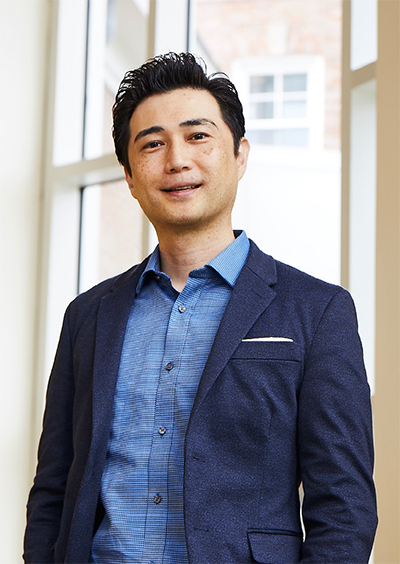
Yasuhiro Yamakawa
Photo: Pat Piasecki
To see Yasuhiro Yamakawa’s online calendar is a bit astonishing. Block after block of time is filled. When others see it, they ask when he has time to eat lunch or dinner.
“We always teach our students to be in action, to learn while doing. I’m just practicing what I’m teaching,” says the associate professor of entrepreneurship, who’s affectionately known as “Dr. Failure” for teaching students to welcome the setbacks that inevitably come in entrepreneurship and business.
Yamakawa has much to keep himself busy. Beyond his work at Babson, he is involved in 16 U.S. and international businesses as an investor, advisor, or board member. Based in Boston, he travels regularly, and he even makes time for a lunchtime ice hockey game three days a week. “I like to be in motion all the time,” he says.
One place Yamakawa frequents is Japan. He was born there, though he moved frequently as a child and continued the wayfaring life as an adult. In all, he has lived in eight countries. “Whenever there was an opportunity for me to jump on something, I moved,” he says.
Once he finally landed at Babson, however, he stopped. He has been at the College for 10 years. He finds it inspiring, and he enjoys interacting with his action-oriented students. “This is the longest I’ve ever stayed in one place,” he says. “I have a good reason. I just love Babson.”
In Japan, Yamakawa leads undergraduate and MBA elective abroad courses. He also is the executive director of Venture Café Tokyo, which hosts a weekly gathering of entrepreneurs, intrapreneurs, investors, educators, and students.
Yamakawa speaks regularly to colleges and companies in Japan. Failure is a frequent topic, which can make businesspeople uncomfortable. “Everyone goes silent,” he says. “Everyone starts looking down.”
Many in Japan see failure as source of embarrassment. So Yamakawa’s message, that failure should be embraced for the many important insights it can offer, is a startling one to Japanese audiences. “It’s all about failing, learning, pivoting, and finding the most successful pathway,” he says.
Yamakawa knows that changing an entire country’s culture is not easy, but when he finishes his talks on failure in Japan, he often receives a standing ovation. – John Crawford
When the Lab Meets the Classroom
David Blodgett integrates his diabetes research into his classes in multiple ways
David Blodgett doesn’t remember anything from his Type 1 diabetes diagnosis just before his third birthday, but that milestone has shaped some of his life’s work in indelible ways.
Blodgett, an assistant professor of biology who joined Babson’s faculty in 2012, also is a diabetes researcher at the University of Massachusetts Medical School, focusing on beta cell gene expression patterns. He and his colleagues examine differences and changes in hormone-producing human pancreatic islet cells, which come from donors who had Type 1 or Type 2 diabetes, were prediabetic, or didn’t have diabetes. Observing those characteristics may be the key to understanding how the diseases develop, and how to treat them.
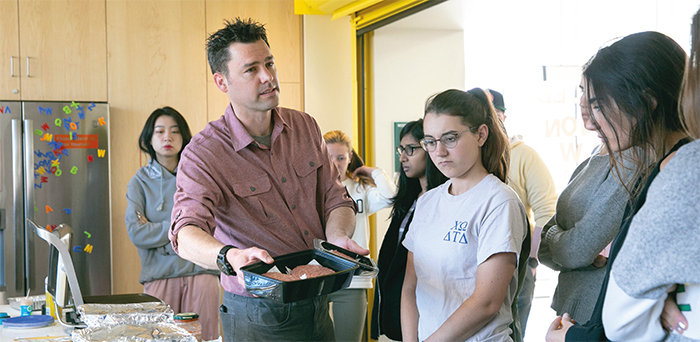
David Blodgett
Photo: Paige Brown
His academic sweet spot is at the intersection of teaching and research, where he can include some of the processes and findings of his research in classes on human biotechnology and sustainable food systems. “For human biotechnology,” he says, “if we’re talking about reprogramming stem cells to become beta cells, that ties back to genetic engineering and personalized medicine.”
Case Studies in Sustainable Food Systems examines the pathways food takes from farm to table, and includes topics such as food security, technology, GMOs, conventional versus organic farming, food waste, and agriculture and climate change.
In this class, Blodgett highlights his thought processes and the systematic ways of doing research to analyze a situation. “For example, plants that are grown in soil—how is that soil treated, and what are the consequences of those treatments? What conclusions can you reach, which ones can’t you reach, and what additional data do you need? These are the same things I ask myself in my research.”
Blodgett likes having two worlds to work from. “I’m lucky enough to have those two perspectives,” he says, “and I think that makes me a better teacher and a better researcher.” – Jeannine Stein
]]>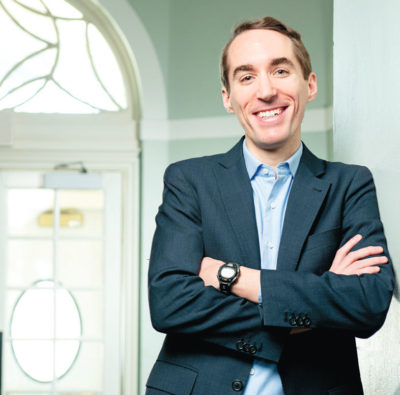
David James MBA’18 brings his faculty coaching program to campus.
Photo: Webb Chappell
You’ve landed as an assistant professor at a prestigious college and you can’t wait to get into the classroom. But, do you have all the skills necessary to triumph as a teacher?
That’s where David James, MBA’18, comes in. James is the co-founder and managing director of Boston-based Beacon Instructional Partners, and his mission is to turn good professors into great ones via customized coaching. During James’ time at Babson he combined his interest in teaching with a love of entrepreneurship, eventually leading him to start his company (the director of marketing is former Babson classmate Shuning Hsu, MBA’18). James returned to campus last fall to work with the Center for Engaged Learning and Teaching on a pilot program to coach assistant professors, calling upon his previous experience in teaching, coaching, and co-founding a middle school in Lawrence, Mass.
“Babson is known to be a great teaching college, and it recruits people who are good teachers and love to teach,” says James. But, not everyone who makes it to higher education has benefited from effective teacher training. “For some professors, teaching is trial by fire,” he adds.
James’ inaugural volunteer group included four assistant professors who had a variety of goals that fell into four categories: developing and expressing clear and aligned objectives, improving assessments and rubrics, increasing student engagement, and creating ways to more effectively check for student understanding.
Coaches observed professors in the classroom over a semester both in person and via video. Subsequent one-on-one coaching was confidential and not connected to any tenure evaluations. “Some of the feedback we got from the professors was that they enjoyed being coached by someone who saw their class, saw the students, and understood what they were trying to do,” James says.
James created a case study, extrapolating data from student evaluations and feedback from the professors. The professors’ comments were overwhelmingly positive, noting increased student engagement, significant breakthroughs and improvements in their teaching, and the ability to achieve their goals.
James is partnering with Babson again this spring, and says that coaching is necessary in a shifting educational landscape. “Yes, you can watch classes online,” he says, “but to get the full experience, you need to be there in person.” – Jeannine Stein
]]>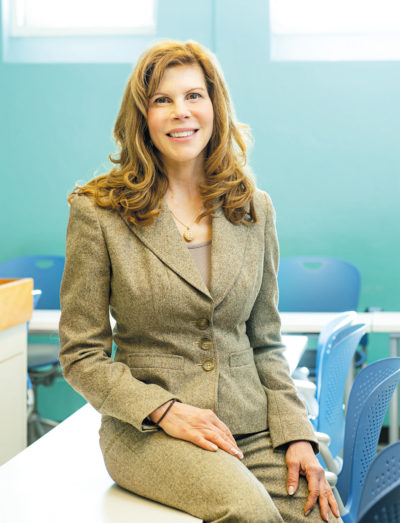
“A student will say, ‘Thank you, I’m seeing things so differently.’” – Mary Godwyn
Photo: Webb Chappell
From the state of business to the condition of the planet, the world can seem filled with inequality, intolerance, and inaction. But, Mary Godwyn, a sociology professor in the History and Society Division, remains an optimist.
In doing copious research for numerous journal articles and books in such areas as diversity, gender inequality, the environment, and business ethics, Godwyn has discovered encouraging progress being made. She’s all too happy to share it with her students.
Examining alternative ecological communities for a book she’s coauthoring gave her substantial material for her Nature and the Environment foundation course. “The first time I taught this three years ago,” Godwyn says, “it was a wonderful experience, but the environmental outlook was really discouraging. I had so little in the way of realistic and attainable solutions to offer students.”
She began researching alternative eco-communities that specifically address contemporary environmental crises and found bright spots in transition towns, communities that use grassroots efforts to reduce reliance on fossil fuels and become locally sustainable. “In many of the towns I studied,” she says, “people were renewing cooperative ties with their neighbors and committing to ethical treatment of their shared environment.”
In examining corporation case studies, Godwyn discovered most of the research focused on male business owners and decision makers and on large corporations run by well-educated white Americans. “And yet what we rely on in this country in terms of business capital,” she says, “are small businesses, and minority women and entrepreneurs are a fast-growing population of business owners.”
Revealing this evidence may rock the ground under some of her students’ feet, but that’s OK. “This disrupts the rules and images they have about who owns a business, who counts, who contributes, and what’s important to include in a business plan,” Godwyn says. She wants them to think about how business creation can reflect personal identity and community values and beliefs.
Shaking young people up has its rewards, she adds. “A student will say, ‘Thank you, I’m seeing things so differently.’ There’s a relief that they can chart a path that reflects a holistic approach to business they can really own and feel good about.” – Jeannine Stein
]]>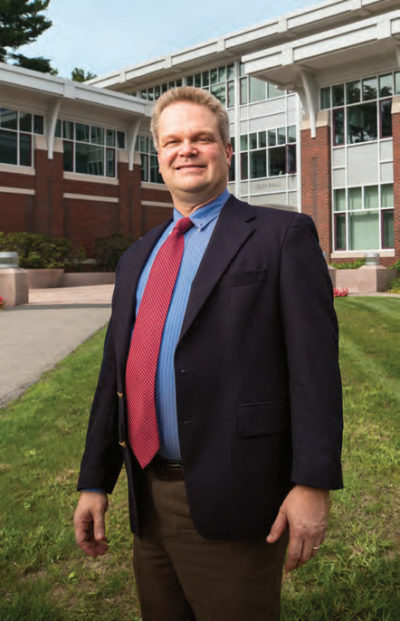
Photo: Tom Kates
Keith Rollag, Murata Dean of the F.W. Olin Graduate School of Business
For seven years, he worked at Procter & Gamble. After graduating with a degree in chemical engineering, Rollag took a job in product development. “I spent several years designing Pampers baby diapers. If you had told me that as a college student, I would have said there’s no way. But actually it was a fascinating product and a competitive industry.” After a few years, Rollag was looking for a more entrepreneurial endeavor within the company, so he transferred to its R&D division in Japan. “I got my passport, started taking some Japanese lessons, and six months later took my first trip out of the country to move to Japan. I spent almost five years there as a product development manager and then as a technical training manager.”
His Ph.D. is in industrial engineering with a focus on leadership. “I was interested in leadership, because I found that in technology development, the technology is often the easy part. It was leading, influencing others, and making changes that was the hard part. So I was at Stanford for about six years, and I focused specifically on newcomers and how you bring them into organizations.”
In the next few years, he sees big changes in graduate education. “It’s changed a lot already in terms of what people are looking for in their education, but it’s going to change so much more. The newer generation of prospective students wants something that’s—in the words of David Abdow, the dean of Executive and Enterprise Education— just in time, just enough, and just for me.” Babson will remain what Rollag calls “high touch,” meaning it will continue to value strong interactions among faculty, staff, and students. But the College also plans to rethink the structure of its MBA, with a smaller core and more electives, and it will expand offerings of smaller, less expensive credentials such as certificates. “This will make it easier for us to adjust our portfolio and learning experiences to match market demands. We’re also giving students the flexibility to tailor their learning experience to their goals and life constraints.”
Education is not just about information anymore, says Rollag. “A lot of what people went to business school for before is now obtainable through two clicks on Google. There are countless articles and videos on leadership and business and entrepreneurship. I was at an HR conference, and a speaker said that by 2030, you’d better be out of the credential-selling business, or you won’t be here. People come to Babson to solve a professional development challenge, whether they want to be promoted or change careers or start a business. And we help them solve the challenges they are dealing with today. We don’t just provide information. We provide professional and business development solutions to individuals and organizations.”—Donna Coco
]]>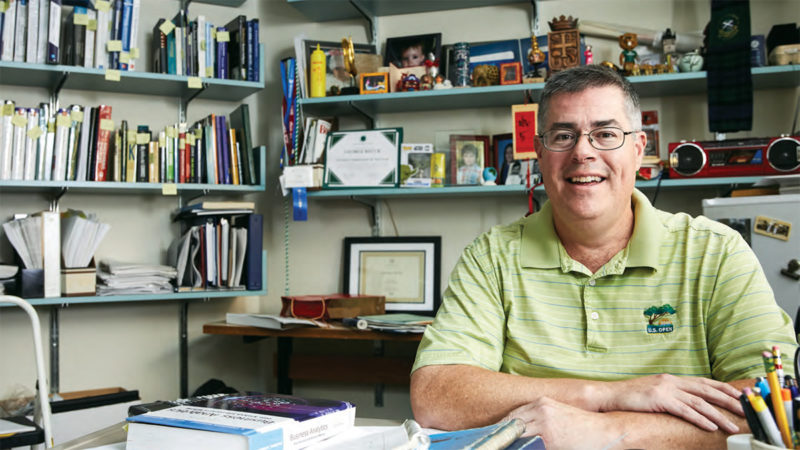 Photo: Pat Piasecki
Photo: Pat Piasecki
Recck has a long history at Babson, having first stepped foot on campus as a student 40 years ago. He still holds on to the notebook (1) from his first-year business law class. “I’ve just kept it,” he says. “It’s a Babson thing.”
Recck started teaching at the College in 1984, and his office sits next to the Math Resource Center, where he is faculty director. One of the more amusing honors he has received through the years was when students voted him “Funniest Professor of the Year,” an award he displays proudly (2). Recck uses humor to help brighten up his math lessons. “You have to keep students engaged,” he says. “It’s not always easy.”
Recck’s name, or at least his work, is familiar to Boston magazine readers. He calculates the publication’s popular rankings of public high schools in the Boston area. The annual rankings can cause anxiety in school leaders, says Recck, who receives concerned calls about where schools landed on the list.
On his office shelves, Recck keeps gifts that students have brought him from countries such as Bolivia, Burma, Canada, China, Scotland, and Thailand (3). “Those small things have helped me keep in mind the global aspect of the school,” he says. “I can become global without leaving the Babson Park campus.”

(1)
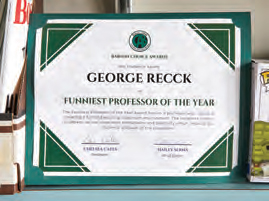
(2)

(3)
« The Stories on the Shelves
]]>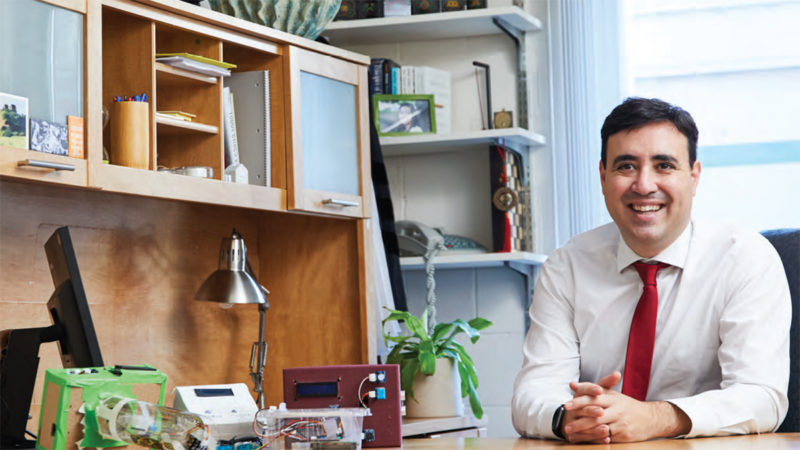 Photo: Pat Piasecki
Photo: Pat Piasecki
Mancha makes sure that the IT courses he teaches are very hands on. “We don’t just talk about technology,” he says. “We build stuff.”
In his office, Mancha keeps many of his students’ prototypes (1), which are made by placing hardware components inside cardboard boxes and old takeout containers. One prototype can be added to a drone and used to measure humidity and temperature, while another can be placed on a pile of grain and, by detecting sound patterns, notify a farmer of an infestation.
Mancha’s research interests include looking at digital technologies in entrepreneurial settings and the social impact of emerging technologies such as blockchain. To perform that research means doing lots of writing, and Mancha keeps in his office an old typewriter (2), which once belonged to his wife’s grandfather. Mancha doesn’t actually use the typewriter, but its presence serves as a reminder of the hard yet rewarding work of the writing process. “It brings me down to what matters: just pressing the keys,” he says.
Mancha also keeps on a shelf a little statue that he made of a stargazer (3). “It’s a reminder to never stop wondering,” he says. “Curiosity keeps us alive.”
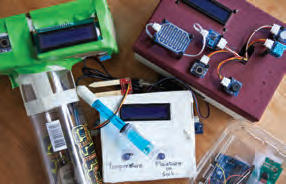
(1)

(2)
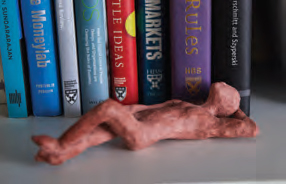
(3)
« The Stories on the Shelves
]]>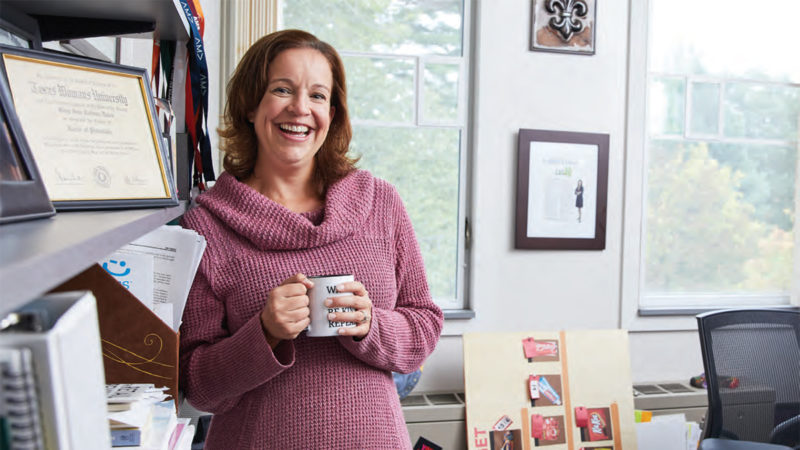 Photo: Pat Piasecki
Photo: Pat Piasecki
If Beitelspacher needs a pick-me-up on a tough day, she glances at a bulletin board on her office wall that’s covered in student thank-you notes (1). “I really treasure them,” she says. “If a student takes the time to handwrite you a note, it makes it all worth it. It makes me feel like I’m doing something right.”
Another source of inspiration for Beitelspacher is her late grandmother’s diploma (2) from Texas Woman’s University, where she earned a Ph.D. in chemistry in 1971. “She was very important to me,” Beitelspacher says. “I always looked up to her.” After Beitelspacher earned her own Ph.D., her proud grandmother said, “I hope you like being a doctor as much as I do.”
In her research, Beitelspacher examines classroom pedagogy, as well as the retailer-supplier relationship. Her students have investigated retail supply chains, and she has saved a number of their projects (3), which touch on topics such as child labor and environmental impacts. “I’m really proud of them,” Beitelspacher says. “The projects made students more reflective of where they do their shopping.”
Beitelspacher was raised outside New Orleans. The cuisine is what she misses most from her old home. “The food here is good,” says Beitelspacher, “but when someone tries to cook something Southern, it’s not usually right.”

(1)
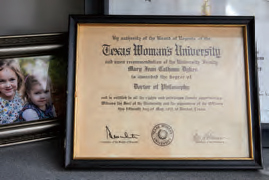
(2)

(3)